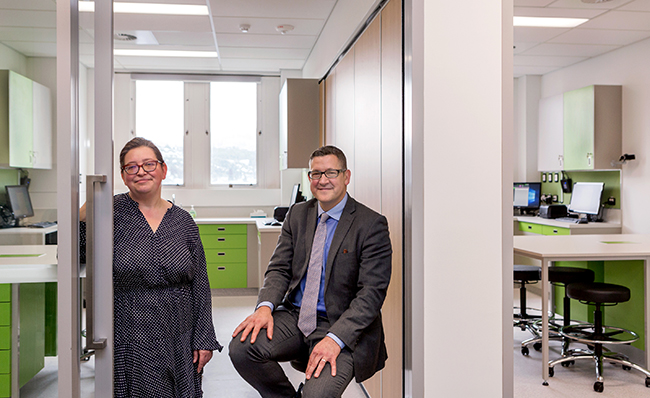 Friday 12 July 2019 8:57am
Friday 12 July 2019 8:57am
Dr Carla Dillon, who heads the pharmacy skills programme, and School of Pharmacy Dean, Professor Carlo Marra.
A freshly-completed laboratory at the University of Otago's School of Pharmacy will enable pharmacy students to practice vital skills they will need on a daily basis when dealing with patients.
School of Pharmacy Dean Professor Carlo Marra says the Virtual Professional Practice Laboratory (VPPL) provides a space to deliver a modernised curriculum for pharmacy students who will go on to provide world-class, patient-centred care.
“This new laboratory helps enhance and strengthen the School's vision to be globally recognised as leaders, innovators and change agents in pharmacy education, pharmacy practice and pharmaceutical sciences, leading to improved health outcomes in communities we serve,” Professor Marra says.
He calls the new facility “game-changing” for the School and its students – as well as being “a really wonderful space” to teach and learn in.
Everybody who had come together to make the “gorgeous” space become reality deserved congratulations, Professor Marra says.
"I go around the world and see a lot of these spaces, because every pharmacy school has one. But this one is probably the nicest in the world."
Division of Health Sciences Pro-Vice-Chancellor Professor Paul Brunton says the University is committed to having a modern School and curriculum – the changes to both reflect how pharmacists' work has morphed from an emphasis on dispensing medication over the counter to spending more time with patients to understand their needs and meet those needs.
Dr Carla Dillon, who heads the pharmacy skills programme, says the VPPL includes a central debrief area and 10 “pods” – independent rooms – where pharmacy students can practice their skills, which includes:
- Reading profiles of potential pharmacy patients and working out what they should be prescribed
- Handing medications prescribed by a doctor to a mock patient, while ensuring the patient understands what the medicine does, how to take it and assessing the patient's overall needs
- Assessing walk-in mock patients' needs and recommending over-the-counter medication, then ensuring the patient understands what the medicine does and how to take it
Both these last two activities are watched by an assessor and videoed, and the student receives feedback afterwards from the mock patient, who does not have a medical background.
The students are also tested in the pods on those two activities virtually every semester under those same conditions – with a mock patient, assessor and video camera – as part of the Objective Structured Clinical Evaluation format.
It is part of the exam to become a licenced pharmacist in New Zealand and covers such skills as communication, professionalism and problem solving.
Otago is one of only two New Zealand universities accredited to provide the training that prepares graduates to become interns and pharmacists, Dr Dillon says.
Chief Operating Officer Stephen Willis says this project – which included the new pharmacy outpatient clinic* – had been completed within the $3.7 million budget, by Assistant Project Manager Kim Sneddon and Senior Project Manager Peter MacNab.
These two redevelopments shared project costs, including design and furniture. They both started late last year, Mr Willis says.
* For more information about the pharmacy outpatient clinic, which opened in April, see the Otago Bulletin Board.For further information, please contact:
Professor Carlo Marra
School of Pharmacy Dean
Email carlo.marra@otago.ac.nz
Liane Topham-Kindley
Senior Communications Adviser
Tel +64 3 479 9065
Mob +64 21 279 9065
Email liane.topham-kindley@otago.ac.nz
FIND an Otago Expert
Use our Media Expertise Database to find an Otago researcher for media comment.